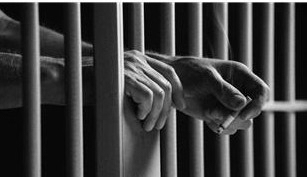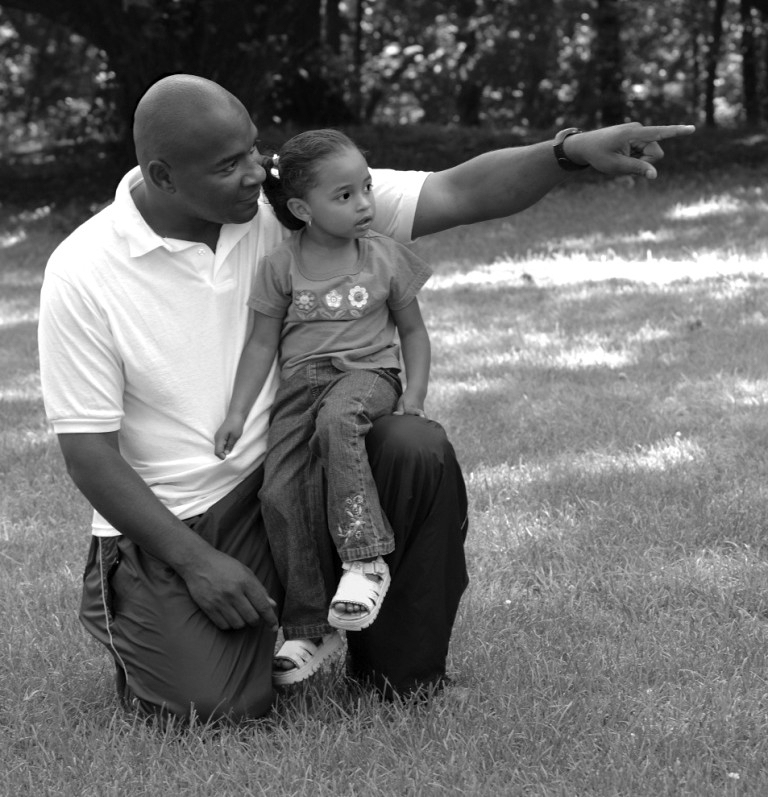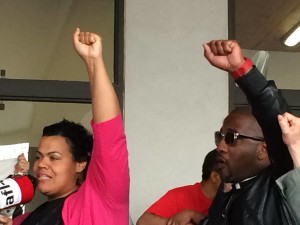Solidarity as Resistance
August 7, 2024Companioning One Another Through These Times
by Nicole Pressley
Organizing Strategy Director, Side With Love – Unitarian Universalist Association
On November 15, 2015, the Minneapolis Police Department killed a black man named Jamar Clark. That night, community members, organizers, and activists formed an encampment outside the Fourth Precinct to demand the release of the body camera footage and justice for Jamar Clark. For 20 days, as the Minnesota winter set in, businesses, organizations, unions, and people came together to build and sustain community. Meals were served, warm clothing was provided, and systems of care, security, and conflict resolution were designed. People danced. People sang. And people preached.
On a very late night, as many of us huddled under the propane heaters donated by the Sierra Club, Rev. Danny Givens preached a sermon about Henrietta Lacks, a black woman whose cells were used without her consent to lead to breakthroughs in science. He called us to remember the many ways in which that violation of black bodies feeds heteropatriarchal capitalism. He invited us into the powerful call to ground our work demanding justice for Jamar Clark in a broader demand to dismantle state violence and commit ourselves to black liberation.
This was the beginning of my journey into Unitarian Universalism. Rev. Danny Givens worked at Unity Church in St. Paul. At this encampment, I experienced “church” and activism in a new and powerful way that transformed my relationship to both. In my prior experience, sermons were delivered from ornate pulpits in the comfort of a building, not on a cold wet street under the threat of arrest and violence from police and white supremacists. The primary subjects were usually men whose stories felt too far away to be easily relevant to the struggles I find to be critical, as a black queer woman. Instead, he elevated the story of a black woman. Instead of focusing on salvation as a reward for our good deeds after death, he opened us up to the possibility of transformation and liberation as an urgent spiritual and political practice.
I reflected on this moment recently as I stood in solidarity with students at their encampment at Northeastern University. I was in Boston because I had the honor of being the respondent to the Minns Lecture, an annual Unitarian Universalist theological presentation, offered by Rev. Jason Lydon a few days previous. Rev. Jason spoke about the UU Service Committee’s National Moratorium on Prison Construction. He opened his remarks with the connection between the police violence against students on Emerson College’s campus and that of the cruelty of the prison system. At the Shabbat service that followed the early morning raid and arrests of Northeastern students, attendees discussed the police repression on Emory’s campus and at Stop Cop City actions in Atlanta. In the midst of this political action, the U.S. Supreme Court heard a case on the criminalization of encampments of unhoused people across the country. With the Court’s ruling in favor of criminalization, students at elite universities and their unhoused neighbors will sit in the same jails, with the same charges, and for different reasons with vastly different resources. I think about how our jails will fill with trans people, medical professionals, and people seeking abortions, because life-saving care is also criminalized.
“If they take you in the morning, they will be come for us that night.”
—James Baldwin
Baldwin wrote these words on November 19, 1970 in a letter to Angela Davis in solidarity after her arrest. These words are not a warning like those we usually hear, “you’ll be next,” or, “first they came for…”. It is an understanding. Baldwin knows, deeply, that being targeted by the state can happen to anyone who finds themselves out of favor with those in power. LGBTQ, BIPOC, and disabled people, union organizers, sex workers, the unhoused, even women in bathing suits have found themselves the target of state based violence.
Criminalization as a tactic is not new, yet under increasingly fascist conditions in this country, we may find the connections between our struggles more easily.
As I wrote in this year’s 30 Days of Love, a project of the UUA’s Side with Love campaign: “before criminalization becomes a political tactic of disconnection and domination, it is first a spiritual acquiescence to dehumanization and disposability. We deny a moral mandate of mutuality in search of the protection of power over others.” Too often, we take up solidarity in a reaction to a threat. We use it as a political strategy, attempting to build larger coalitions as a means to pass or block legislation or win some other material demand for our communities. I hope that instead, like Baldwin, we can begin to know in our bones that our liberation is inextricably bound — that maybe, we are not just all we have, but we, together, are all we need.
What Justice Looks Like
May 2, 2016Sometimes, it is tempting to think about justice only as something “out there,” something that is about causes and actions and social change. But justice is also about how we treat ourselves and the people around us and in our families. The way we treat people individually has a big impact on those larger issues, even if it’s hard to tell right away.
Dr. Cornel West tells us, “Justice is what love looks like in public.” You can tell yourself this quote too, to remind you of why justice is so important. When we work for justice, we are embodying love in our communities; this is how we change the world!
Making Justice Now
May 2, 2016Usually we honor someone from our history who serves as a role model on this page, but there are plenty of UU justice-makers who are living and working right now.
Take, for instance, Lena K. Gardner, who is the Membership and Fundraising Director for our own Church of the Larger Fellowship. Lena is a leader with the Black Lives Matter movement in Minneapolis, Minnesota. She organizes and speaks out and brings people together to protest racist ways that the police have treated Black people in their community and other places around the country.
Working with many other people—many of them young adults or even teenagers, they have protested police killing unarmed Black people and demanded that city officials change policies to hold police accountable.
Always using peaceful strategies, they have held protests in America’s biggest shopping mall and on the highway and in front of a police station.
Some people have objected to the Black Lives Matter slogan, saying that all lives matter. But Lena and many others are pushing people to understand the many ways in which Black people are treated as if their lives don’t matter. They are working for a world where everyone finds fairness.
Calling Forth Justice
May 1, 2016Podcast: Download (Duration: 12:48 — 11.7MB)
Subscribe: More
How many of you have a decent relationship with the Bible —as in, you’ve had at least a couple of conversations and neither of you left angry? Read more →
Anger and Justice
May 1, 2016Podcast: Download (Duration: 14:08 — 12.9MB)
Subscribe: More
The only word repeated more than once in our seven UU principles is the word “justice.” We are called to justice. Read more →
A Public Voice for Justice
May 1, 2016Podcast: Download (Duration: 0:49 — 767.9KB)
Subscribe: More
At the CLF we strive to be a public voice for justice and to curate a conversation that leads to deeper understanding of how we can build a more just world. Read more →
Justice Behind Bars
May 1, 2016Podcast: Download (Duration: 3:46 — 3.4MB)
Subscribe: More
 Three of our CLF prisoner members wrote pieces for Quest Monthly on the theme of Justice. What follows are excerpts from these pieces. Read more →
Three of our CLF prisoner members wrote pieces for Quest Monthly on the theme of Justice. What follows are excerpts from these pieces. Read more →
From Your Minister
May 1, 2016Podcast: Download (Duration: 7:18 — 6.7MB)
Subscribe: More
When it comes to justice-makers on the front lines, one group of people often shows up—mothers. And when mothers truly know that, as the saying goes, “there’s no such thing as other people’s children,” I believe we have the power to accomplish anything. Read more →
REsources for Living
May 1, 2016Podcast: Download (Duration: 4:43 — 4.3MB)
Subscribe: More
 In her column, Rev. Meg talks about how mothers have a special urge toward justice, born out of a fierce love for their children that demands a world where those children—all children—can be safe and respected. Read more →
In her column, Rev. Meg talks about how mothers have a special urge toward justice, born out of a fierce love for their children that demands a world where those children—all children—can be safe and respected. Read more →
About
Quest for Meaning is a program of the Church of the Larger Fellowship (CLF).
As a Unitarian Universalist congregation with no geographical boundary, the CLF creates global spiritual community, rooted in profound love, which cultivates wonder, imagination, and the courage to act.
Contact
Church of the Larger Fellowship Unitarian Universalist (CLFUU)
24 Farnsworth Street
Boston MA 02210

